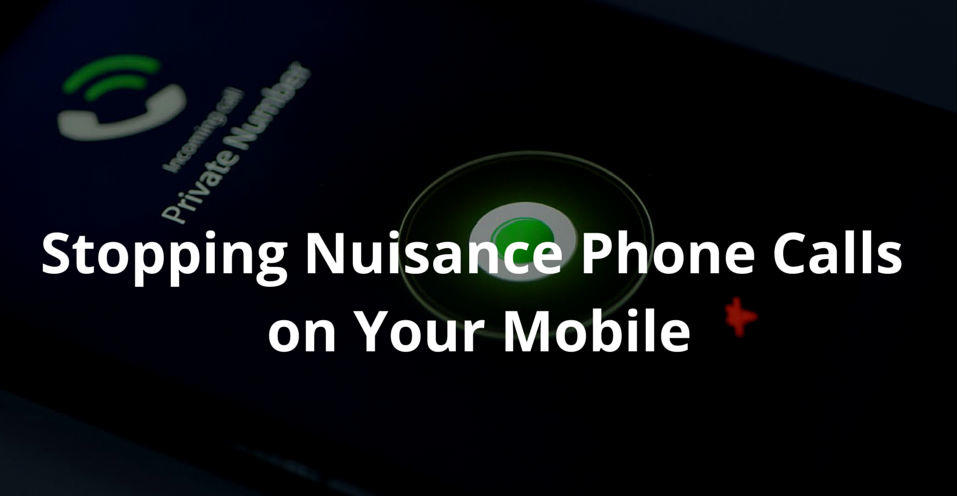Stopping Nuisance Phone Calls on Your Mobile
How many times have you rushed to pick up your mobile, only to find out that it was a telemarketer or maybe an ex-spouse or partner calling to harass you? It’s a serious annoyance isn’t it?
Well, you’re not alone. A record-breaking 180,188 complaints were made in the UK last year, most of which involved nuisance calls made by telemarketers. Despite the massive influx of new complaints, up over 11 per cent in 2014-15, only 5 companies were fined for their actions.
According to Which?, in a survey of more than 2,000 adults, 85 per cent of people received at least one nuisance call in the last month, 18 per cent get over 20 calls a month, and 8 per cent get 50 or more nuisance calls a month. Many of these calls are scams or are offering services that are unneeded or unwanted by consumers.
Another survey done by Citizen’s Advice showed that 30 per cent of people surveyed received nuisance calls about financial services, with at least 1.47 per cent of those being outright scams. But, that doesn’t account for other types of unwanted calls where UK residents are tricked into switching utility providers, badgered into buying goods or services they don’t want or are tricked into calling premium rate numbers to get information about a “prize” they’ve allegedly won.
To curb nuisance calls, a fourth of the population (17.5 million people) has signed up to the Telephone Preference Service (TPS) list. Still, thousands of misconduct claims are filed every day against telemarketing firms. If you find receiving unsolicited calls to be annoying, and you just want it to stop, here’s what you can do to protect yourself.
Nuisance Calls and Scams
While not all nuisance calls are scams or associated with fraud, many are. According to Ofcom, the nation’s communications regulator, there are several types of scams or fraudulent calls you might receive on your mobile. These include:
- Caller ID Spoofing – A trick where the caller masks his or her true identity, making it appear that the caller is someone other than who it really is.
- Spam Texts – An unwanted text message, usually with the intent of selling you something.
- Fax-In-Error Calls – A fax sent to a mobile phone, usually accidentally.
- Overt Abusive Calls – An overtly harassing call you receive from a person or organisation.
- Unsolicited Calls – Calls you receive that you did not ask for and do not want.
- Abandoned or Silent Calls – Calls that are silent or are disconnected when you answer.
Caller ID Spoofing
This type of call involves the caller changing the number from which he or she is calling you from. Normally, a call that comes through is captured by your device and the phone service provider can trace the number of the call for you.
The number is displayed on your phone so you know who is calling. But, scammers try to fool you by changing the number that you see on your mobile.
Sometimes, there’s a legitimate reason for a caller to change the number that’s displayed. For example, a company might want to change the number so that they are giving you the correct callback number just in case you get disconnected.
However, this is normally done with a company that you already know and trust or are considering doing business with.
Those that try to scam you often pretend to be a reputable company, or perhaps a company or organisation that you already trust, like your bank.
They’re changing the caller ID information deliberately to make you think they are someone other than who they really are. They do this to steal your information and possibly to attempt to gain access to your bank account or other financial accounts. Alternatively, they may be looking for personally identifiable information so that they can steal your identity.
VoIP is a phone technology that uses the Internet to make phone calls. It is often used in spoofing because of its low cost of operation and ease of use in spoofing others.
When scammers call you, they may even say that they’re from your financial institution and that they need to collect some of your information. They may claim this is part of a security check or that your personal information may have been compromised. Don’t give them any information.
Your bank, brokerage firm, or other financial institution, shouldn’t be calling you asking you for personal information like your bank account number.
Never rely on the caller ID alone to determine whether the person is really from the organisation he or she claims to be. If you suspect the person might be trying to defraud you, or if you can’t verify that the person is from your bank or financial institution, hang up and notify your bank, financial institution, or the police.
Before you dial out to another number, wait 5 minutes to ensure the call has been permanently terminated and the line is clear. If the scammer does not clear the line by hanging up, then there is a chance that when you attempt to make the next call, you end up talking to the scammer again. They may even have added a ring-tone to their call to make it sound like you are about to make a dial while they wait patiently and silently on the other side. So make sure your line is clear when calling your financial institution to verify the call, that way, you do not accidentally reconnect with the fraudster or an accomplice. Always use telephone numbers that have been provided to you by the companies and banks you deal with. Their literature will provide instructions on how to contact them securely.
If you think you’ve been a victim, ring Action Fraud on 0300 123 2040 or visit the website at https://www.actionfraud.police.uk/.
If you suspect something is a fraud, but you haven’t been scammed yet, ring 03454 04 05 06 and tell the Citizens Advice Consumer Service and tell them so they can pass the information to Trading Standards.
You may also ring the police at 101 or 999 if a crime is in progress.
Spam Texts
Spam text messaging occurs when a company, individual, or organisation sends you an unwanted text message alerting you of something – usually a marketing offer. But, spam texts can be for any number of reasons, including:
Claims Management – This is when a law firm or other organisation texts you about a personal injury settlement or mis-sold payment protection insurance (PPI).
Debt Management – These types of texts involve debt management services.
In general, it’s illegal for anyone or any company to send you spam texts unless you’ve already asked them to send you text messages. If you’ve given a business permission to text you, however, that company can continue to send you texts for other services, but it must offer you the option to opt out.
If they do not, you can file a complaint or forward the number and text to 7726. You will not be charged for this service, but you may receive additional instructions on what you need to do to get the spam texts to stop.
You may also complain to the Information Commissioner's Office (ICO) by ringing their hotline: 0303 123 1113, email them through the website: https://ico.org.uk/make-a-complaint/nuisance-calls-and-messages/spam-texts-and-nuisance-calls/, or sending them a letter in the post: Information Commissioner's Office, Wycliffe House, Water Lane, Wilmslow, Cheshire, SK9 5AF.
Fax-In-Error Calls
Fax-in-error calling happens when you receive a fax transmission to your phone instead of a fax machine. Since this is usually an error and not a fraudulent phone call, you can call the company directly to have your number removed.
You can also contact Fax Preference Service (FPS) by ringing 0845 070 0702, going online to file going online: https://www.fpsonline.org.uk//fps/ and registering, or contacting them by post: Fax Preference Service (FPS), DMA House, 70 Margaret Street, London, W1W 8SS.
The only major thing to watch out for is a followup call from a scammer asking you to pay money to complete your registration. FPS does not charge money for this service, so you should not hand over any personal information, including credit card or debit card numbers, bank account information, or any other payment information.
Overt Abusive or Harassing Calls
When someone rings you and is abusive, whether it’s a stranger, a company you’re doing business with, or some other organisation, you should immediately call your phone company and ask to speak with their nuisance or malicious calls team.
Notify them of the problem, and they may offer you anonymous call blocking. But, be aware that these services aren’t always free and they can also block legitimate calls you receive from overseas.
For example, if you receive regular phone calls from family or friends out of the country, anonymous call blocking might block these calls. If you opt for the service, you will also have to coordinate with your friends or family to make sure important calls get through or you may have to ring them yourself.
If you are receiving threatening calls, and you believe you are in immediate danger, do not hesitate to call 999. If it is not urgent, you should call 101.
Unsolicited Calls
Unsolicited calls are often marketing-related. A company or organisation gets your phone number and starts calling you offering you products or services. Normally, a business must have your permission to ring you for an offer, but many businesses skirt these rules or find creative ways to get you to agree to have them ring you for offers.
For example, if you sign up for, or purchase, anything online, you may be unknowingly agreeing to receive phone calls from solicitors.
Sometimes, these calls are automated. So-called “Robo-callers” or automated calling systems will ring you on a preset schedule. Sometimes, the solicitors are calling about donations to a charity. Other times, they are calling to sell you debt management services or legal services for personal injury claims. Still, other times they are calling to sell you products over the phone.
Marketing agencies and organisations making such calls must have your permission to call you, but if you’ve checked off any boxes online while filling out a form, or while making a purchase, or agreed to terms of service which allowed a business to sell your personal information, you may have already given permission accidentally.
According to PrivacyStar, when you call some 800, 888, and 900 numbers, you may also be caught by something called “Automatic Number Identification” or ANI. These systems don’t get your permission explicitly, but rather implicitly.
Once you dial out, it’s done. The organisation captures your number and sells it to other companies who then call you.
Sometimes, credit agencies also sell your personal information to telemarketers.
The best way to protect yourself is to not sign up for anything online, through the mail, and resist giving out your phone number unless you know who you’re giving it to and you can be assured that your information won’t be sold to anyone else.
If you’re already on a list, call the Telephone Preference Service and ask to be opted out of receiving calls.
Abandoned or Silent Calls
Abandoned or silent calls are an unusual form of nuisance call. An abandoned or silent call is one that is either terminated or fails to connect after you pick up the phone and answer. Usually, abandoned calls aren’t malicious, but rather a technological problem.
Companies that use automated systems to ring you sometimes experience problems with those systems connecting to the other end. Fortunately, Ofcom monitors these kinds of things and may take enforcement action, including fining the company up to £2 million.
If you receive an abandoned or silent call, you should attempt to discover who is behind it by dialling 1471. If you do not want to receive phone calls from this caller, ask to be placed on the “do not call” list. If they persist, you may contact the TPS to request removal and Ofcom to file a complaint.
Try to remember as much as you can about the call, including the times when the company rings you, how many times they’ve called, and over what period of time you’ve received abandoned calls.
People Who Are Most At Risk For Nuisance Calls
The Elderly
While anyone can be the victim of a nuisance call, some groups of people are especially vulnerable. For example, the elderly and single parents may receive an unusually high number of nuisance calls relative to the general population.
In fact, it is estimated that while the average UK resident receives 7 nuisance calls a month, 40 per cent of the phone calls that older and vulnerable residents of Scotland receive are nuisance calls.
These statistics were discovered by Angus Council, East Dunbartonshire and East Renfrewshire, three of the country’s trading standards authorities.
Additionally, The Financial Ombudsman Service found that roughly 80 per cent of individuals who were scammed out of their savings were over 55. About one in five was over 75.
About 38 per cent of victims lost anywhere between £5,000 and £14,999, with 20 per cent of victims losing between £20,000 and £49,999. Some unfortunate victims lost more than £100,000. The most at-risk areas include London and the South East.
The elderly are especially vulnerable to these nuisance calls. Malicious individuals or organisations often prey on them, attempting to get personal information or have the senior hand over his or her life savings.
Some firms try to entice elderly victims with prize winnings or send begging letters. Of course, there is no prize waiting for the victim.
Another scam promises the victim lottery winnings, usually from outside the state or country. And, the senior doesn’t even have to enter. In fact, these organisations contact victims, telling them that their name was drawn at random and they’ve won. Incredible! They didn’t even enter any contest.
The only stipulation is that the elderly victim pays some fee or administrative cost before the money is released. Elderly people tend to be inherently trusting, and so they hand over the cash but never receive the prize winnings.
Yet another scam involves unlicensed financial advisors who attempt to sell seniors unregulated investments which may jeopardise their life savings. While the recent banning of commissions has eliminated many commission-driven fraudsters, the practice of cashing in a pension pot is still a problem for many.
Fortunately, up to 98 per cent of these nuisance calls can be blocked using special call-blocking technology.
Single Parents
Single parents might also be a victim of nuisance calls, especially when there are children involved. An ex-partner may be jealous or feel that the relationship ended badly, and may call directly or put someone else up to ringing their spouse or ex-partners line repeatedly.
Vulnerable individuals need to report all fraudulent activity to the authorities, like Ofcom, immediately. If you suspect you have been, or are about to be, a victim of a crime, call the local police.
Blocking Calls Using Apps
One way to make sure you’re never a victim is to selectively block calls from numbers you don’t know or recognise. The two major platforms that support advanced call blocking are:
- iPhone and;
- Android
On iPhone
When you want to block a number on the iPhone:
- Go into your call log and tap the You will be taken to a new screen.
- Scroll all the way to the bottom and tap “block caller.”
- You will not receive calls from this person anymore.
If you want to see a list of blocked numbers, navigate to Settings > Phone > Blocked.
Truecaller is an app for iOS devices that helps you peek behind the curtain of a phone number to learn who’s really behind the call. Get enhanced caller ID information, search for any number to see who it belongs to, and link directly to Yelp! and other social networks to find the identity of the organisation making the call.
This app makes blocking spam and scammers much easier.
On Android
Android also has powerful options for blocking calls. All you have to do is:
- Open up the phone app.
- Tap on “call settings.”
- Tap the “call rejection” button.
- Tap “auto reject list.”
- Tap the number you want to block. You can also add numbers matching a search string.
As with iPhone, Truecaller for Android can help you block unwanted calls on your Droid. Install the app and use it as you would on iPhone.
Best Practices For Staying Safe
Of course, beyond the apps and settings on your phone, there are some best practices you can employ to avoid being scammed or bothered by unwanted calls:
Stop signing up for free offers.
Free offers are almost never free. When you tick off a box that says you agree to the terms and conditions, read them. Often, part of those terms includes a provision that lets the company sell your personal information. If you agree to these terms, you may start receiving phone calls which you believe are unsolicited.
Unfortunately, because you’ve agreed to terms and conditions which allow for this, there is usually no recourse other than asking to be removed from the organisation’s call list.
Resist paid offers unless you know and trust the business.
Think before you buy into another service, even if it’s a contract renewal. Mobile phone renewals, for example, could trigger an avalanche of follow-up calls, asking you to sign up for additional services or buy additional products from the carrier or a dealer.
These calls can turn into nuisance calls that you can’t easily stop because you’ve already done business with the company and agreed to receive calls from them.
When a business asks you for your contact information before, during, or after a sale, resist it. Most businesses want your number so that they can call you in the future with offers. Unless you want sales calls in the future from a company, just politely decline. If the business or organisation insists, remind them that you are already doing business with them. If they refuse business unless you hand over your contact information, it may be a good idea to do business with someone else.
Don’t agree to anything over the phone if you’re unsure about the caller.
Sometimes, it’s difficult to say “no” to someone over the phone, especially if they’re nice and polite. However, if you do not know the individual, your best response usually is “no.”
Do not give out your credit card numbers, don’t agree to switch utility providers, even if they promise you a lower tariff (always check with your provider first about your rates vs a competitors’). And, don’t assume a friendly inquiry or marketing survey is always innocent. Often, these calls are designed to trick you into buying something you don’t really want.
Do not use your real number.
If you do have to sign up for a service, or you’re buying a product online, sign up for a Google number through Google Voice. This service lets you create a fictitious number which can be easily changed so you’re not giving out your real number. And, it’s easy to set up:
- Go to the Google Voice website and sign in with your Google Account login information.
- Choose a Google Voice Account type.
- Select “I want a new number.”
- Enter a forwarding number and the type of phone you have. This is the phone that will ring when someone rings this new Google number. You can add more phones to this number later if you want.
- Take down the code presented to you and click “Call Me Now” to verify your forwarding phone.
- Enter the code you received previously into the box on the screen.
- Search for an available Google Voice Number. You may search by area code, postcode, word or phrase.
- Select your number.
That’s it. Your new number is now active. When you sign up for services, simply give organisations and businesses your Google number. When they ring it, it will forward the call to your real number.
If you start having problems with nuisance calls, simply get rid of the Google number and get another one. This effectively sets up a shield between you and the would-be nuisance caller.
Add your name to the ‘do-not-call’ list.
The Telephone Preference Service lets you opt out of receiving calls from solicitors. While many individuals are familiar with this service for landlines, TPS will accept mobile phone numbers as well. It’s a good first line of defence.
It will not stop charity organisations, however, and some calls may get through if they are not considered telemarketing calls. These calls may still be considered nuisance calls. However, you should see a dramatic reduction in the number of them.
Conclusion
Nuisance calls are actively monitored by trading authorities and by Ofcom, but scammers still make it through the front lines. Fortunately, the marketplace has fought back and provided consumers with some of the most powerful tools yet to combat fraud and annoyance. Don’t let yourself become another victim. Take control of who calls you. Take back your time. Take back your life.
DOWNLOAD THIS GUIDE IN .PDF FORMAT HERE.
References:
https://www.theguardian.com/money/2013/nov/24/nuisance-calls-hang-up
https://www.which.co.uk/consumer-rights/advice/how-to-stop-nuisance-phone-calls




